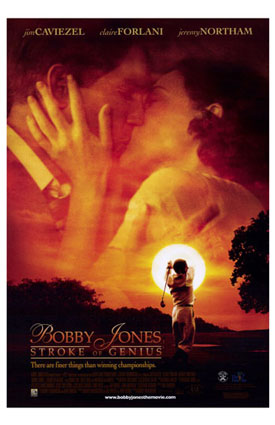
BOBBY JONES: STROKE OF GENIUS
US, 2004, 120 minutes, Colour.
Jim Caviezel, Claire Forlani, Jeremy Northam, Malcolm Mc Dowall, Aidan Quinn.
Directed by Rowdy Herrington.
It depends whether you have heard of Bobby Jones. Americans and golf aficionados will tell you that he is still the only American to have won the golfing Grand Slam – and that he did this in the late 1920s. So, the title is a play on words on his skill as a champion golfer.
The film tells us that Bobby Jones never became a professional. The screenplay has him tell a journalist urging him on to million dollar sponsorships that amateur comes from the Latin word for ‘to love’ and that anyone who turns professional does not love the game. Jones studied law and retired from golf after his successes, bought the land in Augusta, Georgia, and set up the course as well as the Masters Tournament. He also served as a major in World War II. Bobby Jones seems to have been, despite early eruptions of bad temper on the course and a strong-willed decision not to indulge in these displays, a very good man, a truly decent American hero.
Which means that there was not too much dramatic conflict in his life, except to win his wife, win his health, win his games. Which also means that the film veers more towards hagiography than towards gripping drama (except for his grip on the clubs and his powerful ‘genius’ strokes).
The hagiography is more evident when we see that the adult Jones is played by Jim Caviezel, no stranger to goodness. Claire Forlani is his loving wife who, for a time, is not supportive of his golfing career. Jeremy Northam is pumped up as a kind of villain, but he is really only a self-satisfied professional golfer, who does have one outburst, but who proves himself a decent chap as well. (This is a surprise because director and co-writer Rowdy Herrington is best known for some action and bear-em-up thrillers like Road House, Striking Distance, Stickup).
This is one of those films which declares itself based on a true story and an inspirational film, a worthy film about a good man and a dignified and skilful sport.
1.The popularity of sports films? Their limited interest according to the sport? Bobby Jones as a US sport hero? The early 20th century?
2.The locations in Georgia, the visits to Scotland? Atmosphere of the south, of the golfing tours? Ordinary life, homes, the golf courses?
3.The tone of the film, Bobby Jones as an American hero, James Horner’s heavy score? Bobby Jones’ achievement? Retiring at the age of twenty-eight?
4.Bobby as a boy, fragile, his relationship with his parents, his mother’s care, his father’s pride? The girl and their watching the golf players?
5. His own skill at golf, his swing? Imitating the players, imitating the coaches? His skills, the training? The transition to adolescence, his ability to play, the competitions, his winning? Skills, strength, his strokes – and his bad temper?
6.The opening at St Andrews, his memories? His father and his support, mother, the grandfather and the clash with his son about baseball? His grandfather’s despising of golf? Developing his skills, playing for the state, the range of tournaments, his mistakes, losing? Yet the range of support? O.B. Keeler and his continued interest, presence at all the tournaments, the articles he wrote about him? His anger on the course, throwing his clubs, the episode where he hit the woman, the threat of being banned, his letter of apology, his decision to maintain self-control?
7.The difficulties with his health, the varicose veins, the pain in his legs, limping? Being hospitalised? His nerves, stomach disorders? The visits to the doctor, medicine? The final information and the diagnosis of what was wrong with him?
8.O.B. Keeler and his seeing his genius, supporting him? The different coaches? The Scottish caddie and his watching his mistakes, the comment about insanity – doing the same thing over and over expecting a different result? His amateur status, people wanting him to turn professional, the meaning of the word “amateur”, loving the sport, turning professional meaning not loving the sport, the refusal of the million-dollar offer? The press conferences?
9.Walt Hagen, the professional, the cocky manner, his games, the photographs, winning? The press conference and his gift to Bobby? The cufflinks? The anger in the dressing room – not supported by the other players? His final telegram of good wishes?
10.The range of golf players, their gentlemanly manners? A gentlemanly sport?
11.Mary, the courtship, her family, the Catholic background? The wedding, the dance? The family, the children, her tension over the tournaments and his being away, her being upset with him? His asking her to support him in the Grand Slam, her being content, the future with him?
12.The grandfather, the clashes with his son, the disapproval of golf, his growing interest, his reconciliation – and O.B. Keeler’s comment about golf being more important than winning tournaments?
13.Bobby Jones’ subsequent history, his founding the Augusta course, the US Masters, his military service during World War Two, the aftermath? His being a part-time golfer in his young days, his degrees, studying law (and trying to sell real estate), his contribution to America? His being seen as an upstanding American hero?